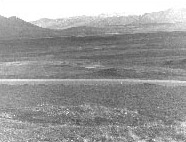Gallagher Flint Station Archeological Site facts for kids
|
Gallagher Flint Station Archeological Site
|
|

Countryside at the site
|
|
| Location | Address restricted |
|---|---|
| Nearest city | Sagwon, Alaska |
| NRHP reference No. | 78003208 |
Quick facts for kids Significant dates |
|
| Added to NRHP | June 16, 1978 |
| Designated NHL | June 2, 1978 |
The Gallagher Flint Station Archeological Site is a very old place in northern Alaska where people lived long ago. It's like a giant puzzle that helps us understand ancient humans. Scientists found it in 1970 while building the Trans-Alaska Pipeline. This site was once the oldest known place where humans lived in Alaska!
It was dated to about 10,540 years ago. This makes it a really important archaeological site. It is also a National Historic Landmark, which means it's a special place protected by the government.
Contents
About the Gallagher Flint Station Site
The Gallagher Flint Station site is in the northern part of Alaska. It sits in the foothills of the Brooks Range, close to the Sagavanirktok River. This area has three main spots where archaeologists found interesting things.
These three spots are called Locality 1, Locality 1A, and Locality 2. They tell us different stories about the people who lived there.
What Was Found There?
Locality 2 is a separate area. Here, scientists found two ancient campfires, called hearths. They also found stone tools, including special blades that were shaped on both sides. This spot shows signs of tool-making. The items found here are about 3,000 years old.
The other two spots, Locality 1 and Locality 1A, are close together. Locality 1A has items that are about 2,650 years old. Here, archaeologists found pieces of a drill bit made from green chert, which is a type of hard rock.
The Oldest Discovery
Locality 1 is the most exciting part of the site. It seems to have been a workshop where people made tools. The items found here are about 10,540 years old! This was the oldest human activity ever found in Alaska at the time.
Before this discovery, the oldest sites in Alaska were around 10,000 years old. Even older sites have since been found, like the Dry Creek Archeological Site.
Tools and Ancient Life
One interesting thing about the stone tools from Locality 1 is that they didn't include "bifacial" tools. These are tools shaped on both sides. This is different from many other ancient sites.
None of the three areas had tools made from animal parts, like bone or antler. This suggests that the people might have used these materials in other ways or at different locations.
Scientists believe the Gallagher Flint Station was a quarry site. This means ancient people came here to get stone for tools. They likely worked on their tools while watching the land for animals to hunt. It was a good spot to see prey from a distance.
The site was recognized as a National Historic Landmark in 1978. It was also added to the National Register of Historic Places in the same year. This helps protect it for future generations to study and learn from.
 | Mary Eliza Mahoney |
 | Susie King Taylor |
 | Ida Gray |
 | Eliza Ann Grier |

